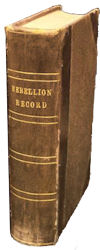The evidences of a purpose on the part of the secessionists to seize upon the public property and usurp the Government at its capital, have become so clear that energetic measures are taking to defeat their plans, and repress the treason. Now that the Administration begins to appreciate the necessity of preserving the Government, and manifests the purpose to repudiate the treasonable influences which have hitherto paralyzed its arm, the people are beginning to report facts exposing the violent plots concocting in the District and its neighborhood.
It is now well known that military companies have been organized and drilled for months past in Maryland and Virginia—some of them under the eye of an officer of the regular army —and that the distinct object of their organization is to aid in the seizure of Washington city in the interest of the disunionists, or the prevention by force of Lincoln’s inauguration, Some of the less prudent of their leaders boast in private circles that they have five thousand well-armed and organized men ready to strike the blow instantly upon the concerted signal being given.—Times, Jan. 2.
—At Charleston, the attitude of the Administration is regarded as warlike.
A censorship is exercised over the telegraph, and the city is nightly patrolled by the military. It is proposed to starve out the troops at Fort Sumter, and then attack them on rafts with the aid of batteries already erected. There is a battery of earthwork, logs, and sand, on the end of Sullivan’s Island, and also one on Morris’ Island.
Commander Pettigru, of Castle Pinckney, orders that no boat shall be allowed to approach the wharf-head without permission, under penalty of serious consequences in case of violation. The city river-front is carefully guarded. The Palmetto Guards, 100 strong, have charge of the arsenal under the palmetto flag, instead of the Federal flag.
Collector Colcock notifies ship-masters that all vessels from and for ports outside of South Carolina must enter and clear at Charleston.
The Columbia Artillery, numbering 50 men, arrived at 1 o’clock to-day, and proceeded to the harbor. They will use cannon belonging to Charleston.—Boston Transcript, Jan. 2.
In South Carolina Convention passed an ordinance to define and punish treason. It declares that in addition to that already declared treason by the General Assembly, treason against the State shall consist only in levying war against the State, adhering to its enemies, and giving them aid and comfort. The penalty is death without the benefit of the clergy.— Evening Post, Jan. 2.
![]()









